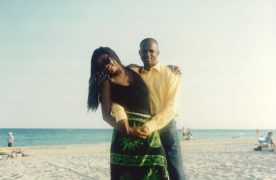Tobias Wolff conquered the memoir with his critically acclaimed ‘This Boy’s Life’ and now he is taking a leap into the world of fiction with his first novel. A mixture of Dead Poets Society and ‘School Ties,’ Wolff’s ‘Old School’ juxtaposes the familiar setting of a boy’s prep school with the themes of competition, honor, secrets and literature. But here, Wolff adds a new twist to the often-utilized prep school paradigm.
This twist is the strongest part of Wolff’s story. ‘Old School’ is set in the 1960s and Wolff has literature’s most famous authors of the time move in and out of the novel with ease. The boys compete for an audience with the visiting writers, which include Robert Frost, Ayn Rand and Ernest Hemingway.
Wolff effectively captures the essence of the three writers’ drastically different and famous personality traits. Frost is shy and artificially hesitant for dramatic effect. Rand arrives with an entourage of her most devoted followers and proceeds to rip apart anyone who fails to grasp her philosophy. Hemingway is very brash, unapologetic and a no-show due to his alcoholism.
The nameless narrator of the novel is an aspiring writer who is at the school on scholarship. He is half-Jewish (on his father’s side) but was raised Catholic. The year before, his mother shared this information about his heritage with him while on her deathbed.
The knowledge of this is enough to send him into a spiral of self-examination as he hides his background from others. He finds out his roommate, Bill, is Jewish as well. They never speak of it, despite the narrator being tempted on numerous occasions to bond with him over and form a true friendship. The narrator’s senior year is filled with the internal turmoil of how this new information changes his entire identity.
While trying to figure out what to write for his Hemingway piece, the narrator stumbles across an old literary magazine from a nearby girl’s school, with a story about a girl’s struggle with her Jewish background. He so strongly identifies with the piece that he enters it into the contest as his own, with a few minor changes. Hemingway, his favorite author, chooses the story as the winner. Not surprisingly, the narrator’s plagiarism is discovered and his entire life is thrown into shambles as he is expelled.
‘Old School’ requires concentration and contemplation for the message to truly come across. Some pieces of the puzzle seem irrelevant, but in the end turn out they are crucial to Wolff’s story. The author surprises the reader in the book’s tail end, focusing solely on the consequences that result from the narrator’s breach of the school’s honor code.
However, the understanding of the subtle emphasis of honesty throughout the novel brings everything into perspective. It is not just the students who are influenced by the teacher; it is the teacher who is influenced by the students. This, along with the fascinating literary guest appearances, helps to keep ‘Old School’ from rehashing a tired tale.
How many men can say that their life was made into a movie starring Leonardo DiCaprio? It is indeed a very small club, but Stanford professor Tobias Wolff can claim membership. The author of ‘This Boy’s Life’ has written a new novel, ‘Old School,’ and the Muse was lucky enough to speak with Wolff following an appearance at the Harvard Bookstore in Cambridge.
Muse: Where did the idea for ‘Old School’ come from?
Wolff: I’d been thinking about it for years. I was a student in such a school. I was a scholarship student and the experience of coming to a place where I was such an outsider, and anxious not to be seen as one, stayed with me. There was all the social negotiation that was required that I didn’t manage very well but thought about a lot. The consciousness that I had of the difference between the way I lived and the way other people lived wasnít something that I had thought a whole lot about before because I had never been in close proximity to those who had a lot of money or who were famous.
Muse: Did any of the famous writers in the book actually visit your school?
Wolff: I was kind of young when Frost came and I didn’t get anywhere near him. I didn’t even hear most of what he said, so thatís one of the pleasures of writing is you get to revisit these things that were maybe unsatisfactory at the time and kind of get them write. William Goldin, the author of ‘The Lord of the Flies,’ also came.
Muse: There’s a passage in ‘Old School,’ where the narrator is describing the feeling of writing a very personal poem. Did you have the same feeling when writing your memoirs?
Wolff: Yes, I felt very uneasy often when I was writing. When I was first writing, I tended to avoid writing anything autobiographical. When I did it would make me very, very uncomfortable. When I wrote ‘This Boy’s Life,’ it was a good 25 years since I had lived through those events. I was able to see them from enough of a distance and they didn’t scare me off. But there was a lot in there that embarrassed me to remember.
Muse: Which do you prefer to write memoirs or fiction?
Wolff: Whatever I’m writing at the time is what I prefer to be writing. Every kind of writing has its own consolations and drawbacks.
Muse: Which authors influence you?
Wolff: I loved Jack London. I even changed my name to Jack, at one point, because I liked his work so much. I liked O. Henry because of trick endings. I used to imitate these writers when I was young. At a certain point the influence becomes more of a question of you’re being excited by what you read and you wanting to write really well yourself to be in the company of the writers you are reading.
Muse: What advice would you give to young writers?
Wolff: Maintain a certain objectivity, and have patience.
This is an account occasionally used by the Daily Free Press editors to post archived posts from previous iterations of the site or otherwise for special circumstance publications. See authorship info on the byline at the top of the page.













